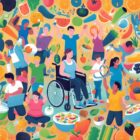How to Determine Your Eligibility for Food Stamps

Are you wondering if you qualify for food stamps? Look no further!
This article will guide you through the process of determining your eligibility. By following the income guidelines, assessing your household size, and meeting citizenship and residency requirements, you can determine if you qualify.
Additionally, your employment status and evaluation of assets and resources will play a role in the eligibility determination.
Read on to find out if you meet the requirements for food stamp assistance.
Key Takeaways
- Calculate your income accurately according to the provided guidelines, considering all sources of income and any allowed deductions.
- Report the correct number of people in your household, including those who live with you and share meals, and update it if there are any changes.
- Make sure you meet the citizenship and residency requirements, being a U.S. citizen or eligible non-citizen, living in the state where you are applying for benefits, and having a valid Social Security number or having applied for one.
- Familiarize yourself with the work requirements in your state, as some states have them, and understand the exemptions that may apply to certain individuals. Meeting work requirements is crucial for eligibility.
Income Guidelines
To determine your eligibility for food stamps, you need to calculate your income according to the guidelines provided. The income guidelines are designed to ensure that those who truly need assistance are able to receive it.
When calculating your income, you should consider all sources of income, including wages, self-employment income, and any government benefits you may be receiving. It’s important to note that not all income counts towards your eligibility. For example, certain deductions may be allowed, such as childcare expenses or medical costs for elderly or disabled family members.
Additionally, the number of people in your household will also affect your eligibility. The income guidelines take into account the size of your household and set limits based on the federal poverty level.
It’s crucial to accurately report your income and household size to determine your eligibility for food stamps. If you’re unsure about how to calculate your income or have any questions, it’s recommended to contact your local food stamp office for assistance.
Household Size
Consider the number of people living in your household when determining your eligibility for food stamps. Household size plays a crucial role in determining the amount of assistance you may receive. The more people in your household, the higher the income threshold for eligibility.
To determine your household size, include all individuals who live with you and share meals on a regular basis. This includes family members, such as spouses and children, as well as non-relatives who live in your home. However, individuals who live separately, even if they’re related, shouldn’t be included in your household size.
It is important to accurately report the number of people in your household when applying for food stamps. Providing false information can result in penalties, including loss of benefits and legal consequences. Additionally, remember to update your household size if it changes during your enrollment in the food stamp program.
Citizenship and Residency Requirements
When determining your eligibility for food stamps, you need to meet certain citizenship and residency requirements. These requirements ensure that the program benefits are provided to individuals who are legally residing in the United States and are in need of assistance. Here are the key points to consider:
- Citizenship: To be eligible for food stamps, you must be a U.S. citizen or an eligible non-citizen. Eligible non-citizens include lawful permanent residents, refugees, asylees, and certain humanitarian immigrants. Undocumented immigrants aren’t eligible for food stamps.
- Residency: You must also meet residency requirements to qualify for food stamps. Generally, you must live in the state where you’re applying for benefits. Additionally, you must have a valid Social Security number or have applied for one. In some cases, non-citizens may be eligible for food stamps if they meet specific residency requirements.
- Work Requirements: Some states have work requirements for food stamp eligibility. These requirements may include being employed or participating in a work training program. However, exemptions exist for certain individuals, such as those with disabilities or caretakers of young children.
Meeting the citizenship and residency requirements is crucial in determining your eligibility for food stamps. It’s important to review the specific guidelines in your state to ensure you meet all the necessary criteria.
Employment Status
You must meet certain employment status requirements to determine your eligibility for food stamps. The Supplemental Nutrition Assistance Program (SNAP) takes into account your employment situation to determine if you qualify for benefits. To help you understand the criteria, here is a breakdown of the different employment status categories and their corresponding eligibility:
| Employment Status | Eligibility Criteria |
|---|---|
| Employed | Your income must be within the program’s income guidelines. |
| Unemployed | You may be eligible if you are actively seeking employment. |
| Self-Employed | Your income and expenses will be evaluated to assess eligibility. |
| Underemployed | If your income is below the program’s income guidelines, you may qualify. |
It is important to note that these are general categories, and specific eligibility requirements may vary by state. In addition to your employment status, other factors such as household size and income will also be considered in the determination process. Now that you understand the employment status requirements, let’s move on to the next section, which will discuss how your assets and resources are evaluated in determining your eligibility for food stamps.
Assets and Resources Evaluation
To assess your eligibility for food stamps, the evaluation of your assets and resources is an essential aspect. When determining your eligibility, the government takes into account the value of your assets and resources. Here are three key points to consider:
- Asset Limits: Each state has its own set of asset limits that you must meet in order to qualify for food stamps. These limits include cash, bank accounts, and other resources that can be easily converted into cash. It’s important to know the asset limits in your state, as exceeding them may make you ineligible for benefits.
- Exempt Assets: Certain assets are typically exempt from consideration when determining eligibility. These include your primary residence, a vehicle, and personal belongings. However, it’s important to note that there may be specific rules and limits regarding these exempt assets, so it’s crucial to understand the guidelines in your state.
- Resource Limits: In addition to assets, your resources are also evaluated. Resources refer to income, such as wages, self-employment earnings, and government assistance. It’s important to accurately report all sources of income to ensure an accurate assessment of your eligibility.
Frequently Asked Questions
Can I Apply for Food Stamps if I Am Currently Receiving Unemployment Benefits?
You can apply for food stamps if you’re receiving unemployment benefits. The eligibility for food stamps is based on your income and household size, so your unemployment benefits will be considered in the determination process.
Will Receiving Food Stamps Affect My Eligibility for Other Government Assistance Programs, Such as Medicaid or Housing Assistance?
Receiving food stamps won’t affect your eligibility for other government assistance programs like Medicaid or housing assistance. They have separate eligibility criteria, so you can receive benefits from multiple programs if you qualify.
Can I Apply for Food Stamps if I Am a College Student?
As a college student, you can apply for food stamps if you meet certain eligibility requirements. These requirements may include factors such as income level, enrollment status, and whether you are working.
Do I Have to Be the Head of the Household to Apply for Food Stamps, or Can Other Members of the Household Apply Individually?
You don’t have to be the head of the household to apply for food stamps. Other members of the household can apply individually. Eligibility is determined based on income and other factors.
What Types of Income Are Considered When Determining Eligibility for Food Stamps?
When determining your eligibility for food stamps, various types of income are considered. This includes wages, self-employment earnings, alimony, child support, and certain government benefits. It’s important to provide accurate information about your income when applying.



